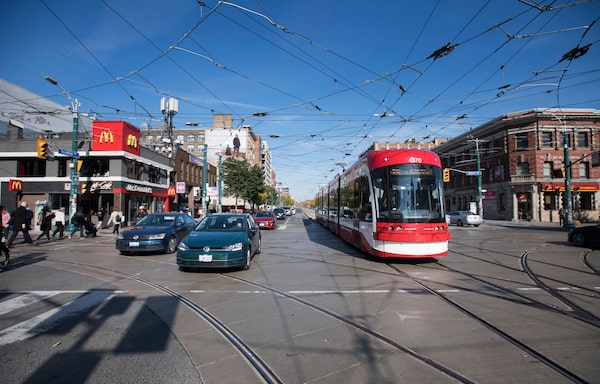
The Liberals said the transit plan was costed based on the assumption that ridership recovers fully by the start of 2024.Fred Lum/The Globe and Mail
The Ontario Liberals are promising to cut temporarily the fare for every transit route in the province to $1 if they form government, raising questions about whether agencies would be able to handle a potential surge in ridership.
The party rolled out the policy plank on Monday, shortly before an official election call. The formal start of a campaign is set for Wednesday toward a vote on June 2. However, all the major parties already have been making announcements.
Also on Monday, Caroline Mulroney, who has been Transportation Minister for much of the Progressive Conservative government’s current term, announced that design work would begin for a new interchange that would form part of an eventual highway project bypassing the community of Morriston, south of Guelph.
These dueling announcements helped illustrate where the parties see their electoral potential. The Conservatives have leaned heavily on promises to build new roads, while also continuing to fund transit capital expansion. The Grits previously axed one of the highways the Tories are now pursuing, and pitched Monday’s fare reduction proposal as a way to reduce the number of auto trips.
The Liberals promised the lower transit fares within 100 days of taking office, and to keep them at $1 until January, 2024. Party spokeswoman Andrea Ernesaks said in an e-mail that a Liberal government would, at that point, “evaluate this initiative’s impact on ridership and determine next steps in consultation with municipalities and transit authorities.”
Ontario political parties enter campaign mode as election call looms
The party also promised to cover the revenue shortfall these lower fares would cause transit agencies, pegging the total at around $1.81-billion through 2023-2024, and chip in $375-million annually for day-to-day operations.
Transit watchers welcomed the additional funding, although they were uncertain whether the extra operating money would be enough if the cheaper fare helps attract riders.
“A crowded and delayed ride for a dollar just makes transit a worse option, and just pushes more people towards car ownership,” said Cameron MacLeod, executive director of the transit advocacy group CodeRedTO.
“My gut feel is … the $375-million is not enough. It’s a starting point, but you know, if you make transit attractive there’s a lot of latent demand.”
Shelagh Pizey-Allen, executive director of the advocacy group TTCRiders, pointed to the need to have both cheaper fares and an improved experience for users.
“Riders do need fare relief, but it’s true that it’s just one part of the equation,” she said. “Lower fares and more frequent service is what will win back transit users and increase ridership.”
The pandemic has hit transit hard. The virus made many people wary of enclosed, crowded spaces, and large numbers of former commuters began to work from home. Ridership plummeted in most cities, leaving agencies deep in the red. Higher levels of government have bailed them out repeatedly.
The Liberals, now led by former provincial transportation minister Steven Del Duca, said the plan was costed based on the assumption that ridership recovers fully by the start of 2024. They did not provide modelling to show the role the lower fare would play in that recovery.
In an e-mailed statement, the New Democrats shot back that when Mr. Del Duca was in government and running the transportation file, “his priority was millions on a GO station in his riding,” adding: “On transit, you can’t trust the Liberals to fix what they helped break.”
The Tory campaign did not respond to a request for comment.
These lower fares would apply to local transit as well as the more heavily subsidized GO regional rail network and Ontario Northland bus routes.
In a cheeky framing, the Liberals contrasted their “buck-a-ride” promise with the Tories’ pledge four years ago to reduce the minimum legal price of beer to $1. “The lowest priced beer on the LCBO website is $1.65,” the party’s release notes.
Our Morning Update and Evening Update newsletters are written by Globe editors, giving you a concise summary of the day’s most important headlines. Sign up today.
 Oliver Moore
Oliver Moore